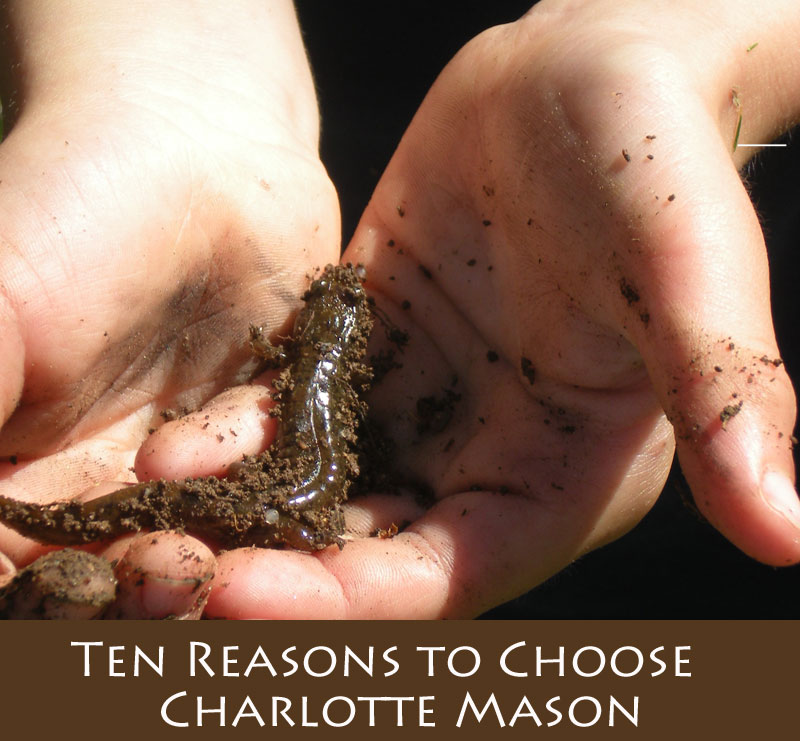This is the first post in a series called Homeschooling Voices. This blog series features homeschooling families from diverse homeschooling experiences. We thought we would begin this series by sharing a bit of our own experience.
 If you are homeschooling already you have probably gotten beyond the reasons why or why not to homeschool, but most likely you still ask yourself occasionally (or often) how do I homeschool? There are a myriad of choices out there – everything from a classical curriculum to unschooling. I feel fortunate to have run across a lady by the name of Charlotte Mason even before our family was convinced that homeschooling was what we wanted to do.
If you are homeschooling already you have probably gotten beyond the reasons why or why not to homeschool, but most likely you still ask yourself occasionally (or often) how do I homeschool? There are a myriad of choices out there – everything from a classical curriculum to unschooling. I feel fortunate to have run across a lady by the name of Charlotte Mason even before our family was convinced that homeschooling was what we wanted to do.
Charlotte Mason was something of an entrepreneur in education. She lived in the latter half of the 1800’s in England, wrote books about geography, and gave lectures about educating children. During her lifetime it was common for children to have nannies, and for the parents to be little involved in their upbringing. She set about to train nannies, governesses, and parents how to teach their children – which later came to be known as the Charlotte Mason philosophy. Later she established a teaching college, Ambleside which is alive and well today. Above all she preached that children are persons and should be treated as such.
There are many resources where you can learn more about Charlotte Mason (CM) that will be featured in another post. Here, however, I want to share a list that I wrote several years ago. I am reposting it here because this year I am refocusing on these ideas – a sort of going back to my roots. This is how I began my homeschooling career and now that my oldest child is sixteen I see the fruits of his early education which was rooted in these ideas. I feel like we gradually moved away from these ideas unintentionally through our involvement with other groups which did not share this same philosophy of education. I began to see a difference in my younger children who have not had as strong a foundation in these ideas. It is a difference I do not care for and so thus the refocusing. I write this as much for me as for you!
Ten Reasons Why Our Family Chose Charlotte Mason
1. The knowledge of Christ is foremost and center.
2. I Am, I Can, I Ought, I Will (a CM motto).
This idea encourages training and strengthening the will of the child to know who he is, to know his abilities, to know his sense of responsibility, and to walk in all of that knowledge.
3. Something to Love, Something to Think About, Something to Do (another CM motto).
A child needs an active heart, an active mind, and an active body to be healthy. A good curriculum will educate all these faculties.
4. Spend time outside every day.
It is necessary to set aside time to enjoy and learn or recapture a sense of wonder about the world and discover our Creator through his creation. It also exercises the body and creates a healthier less stressed mental attitude.
5. One habit at a time to build character.
CM says, “Begin with the habit of attention and allow no dawdling.” Easer said than done but habits are important.
6. Introduce your child to The Arts
Art and Music are just as strong a form of communication and worship as are words. Children should learn these language as well – to be able both to comprehend them and express themselves through them.
7. Nature Study
Scientific study for children should begin with the world around them. Learn how to keep a nature notebook and use it often.
8. Living Books
Salt your children with the world of lovely books written by people who love their subject. Read those things which draw you in, are conversational, and make you want to live out the story or go explore a new idea. This is an excellent way to give children “something to think about”.
9. Narration
Telling what you know develops children’s language and writing skills, strengthens their memory and recall, and increases retention of material studied. As they grow, narration leads children to begin evaluating what they have read and begin forming their own questions and opinions.
10. Handicrafts
Since we are created in the image of our Father who created the universe and everything in it, it follows that we also are creative and should exercise that creativity. Handcrafts give children something worthwhile and beautiful to do. They require coordination, teach perseverance and attention, and often lead to children being helpful in many other areas of family life.